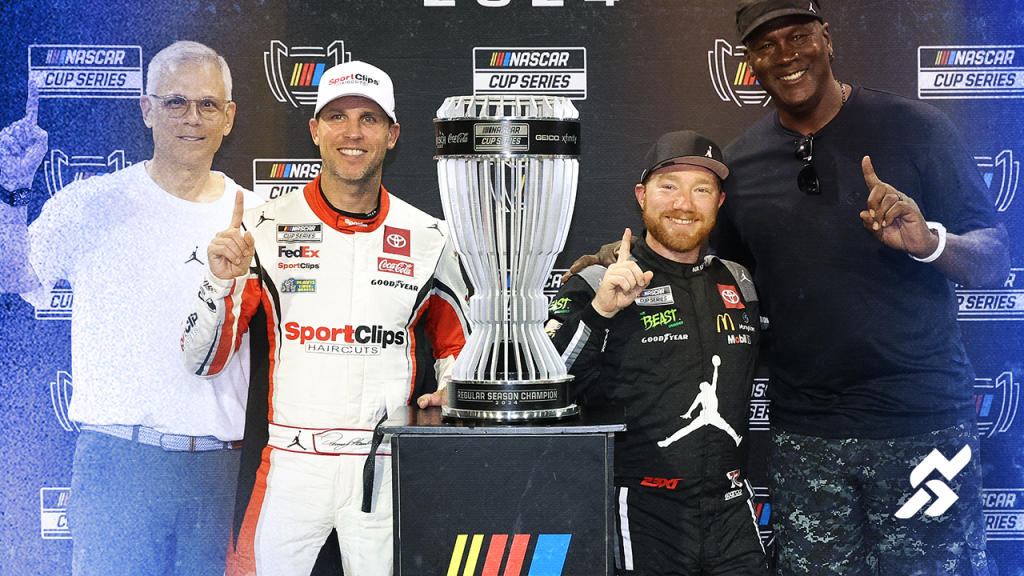Front Row Motorsports, 23XI Racing and Curtis Polk—who co-owns 23XI Racing with Michael Jordan and Denny Hamlin—argue that NASCAR’s counter lawsuit against them for orchestrating an “illegal cartel” should be taken off track.
Last Friday, the teams’ lead attorney, Jeffrey Kessler, filed a motion for summary judgment with U.S. District Judge Kenneth D. Bell. The focus of the nearly year-long legal battle has been 23XI and Front Row accusing NASCAR and CEO Jim France of suppressing the competition, and NASCAR countersued in March.
NASCAR depicts 23XI and Front Row as abusing antitrust litigation to rewrite contractual terms to their advantage. 23XI and Front Row disliked what NASCAR offered through charters, which guarantee starting positions in NASCAR-sanctioned races. Charters come with conditions, such as restrictions on competing in other circuits and a mutual release of claims, that NASCAR maintains have increased the value of charters and provided a stable and competitive market. While other teams have accepted this tradeoff, 23XI and Front Row haven’t; they seek preferred terms that they maintain are justified given NASCAR’s degree of control over the marketplace for premier stock car racing teams.
As NASCAR tells it, 23XI and Front Row went beyond merely rejecting the terms of a contract offer. The teams—which, as competing businesses, can run afoul of antitrust law if they collude in ways that harm competition—also allegedly threatened group boycotts of NASCAR events.
Polk, a longtime business partner of Jordan who was vice chairman of Hornets Sports & Entertainment when Jordan was the NBA team’s majority owner, is depicted as masterminding efforts to undermine NASCAR. Among NASCAR’s accusations is that Polk met with at least one NASCAR media partner during negotiations for a new NASCAR media rights agreement, a meeting that NASCAR portrays as disruptive given Polk’s “threats.” Polk also allegedly applied “coercion” against other teams’ owners to “not break ranks” by accepting NASCAR’s terms. Further, Polk is described as “orchestrating a scheme to extract even more money from NASCAR and the industry for the benefit of himself, his team 23XI and Front Row, among others.” These alleged activities led NASCAR to weigh contingency plans in the event of a work stoppage.
Not so fast, Kessler insists in the summary judgment brief. He writes that NASCAR’s counterclaims reflect “litigation gamesmanship designed to retaliate” against 23XI, Front Row and Polk, as well as a ruse to distract from NASCAR’s “monopolistic practices.”
Kessler also maintains that evidence uncovered in pretrial discovery fails to show his clients “participated in any conspiracy in unreasonable restraint of trade.” As Kessler tells it, the teams “never” agreed to prevent NASCAR from individually negotiating with teams. He points out that 13 of the 15 chartered ultimately signed the 2025 charter agreement “on terms” that NASCAR allegedly “demanded,” a fact that Kessler says undermines the possibility a boycott was afoot.
Kessler also disputes that Polk engaged in wrongdoing. He notes that Polk only became involved in NASCAR in 2020, four years after the charter system was created and a year after teams “began to have new joint negotiations with NASCAR over the charter system.” Kessler challenges NASCAR’s description of Polk as an orchestrator of disruption when (as 23XI and Front Row see it) the timeline indicates his involvement would have come too late for him to acquire such an authoritative role. Kessler also argues that “other teams often did not agree with Mr. Polk’s views,” a depiction intended to downplay Polk’s influence.
NASCAR will have the chance to try to rebut Kessler’s arguments. Meanwhile, unless they reach a settlement, the parties are just 77 days away from a trial in North Carolina.
Read the full article here



